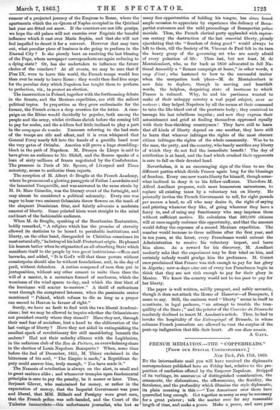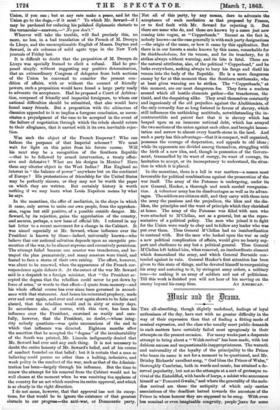New Yoek, Feb. 17th, 1863. Br the intermediate mail you
will have received the diplomatic correspondence published here on Friday last, relative to the pro- position of mediation offered by the Emperor Napoleon. Stripped of its verbiage, its assuranaes of distinguished consideration, the ornaments, the elaborations, the efflorescence, the floridity, the flatulence, and the profundity which illumine the style diplomatic, its plain meaning is this :—" You Americans over there have quarrelled long enough. Get together as many as may be necessary for a great palaver ; talk the matter over for any reasonable length of time, and make a peace. Make a, peace, and save your
Union, if you can ; but at any rate make a peace, and let the Union go to the dogs,—if it must." To which Mr. Seward—if I may be pardoned for reducing his polished diplomatic rhetoric to the vernacular—answers,—" No you don't."
Whoever will take the trouble, will find precisely this, no more, no less, in a bad translation of the French of M. Drouyn de Lhuys, and the unexceptionable English of Messrs. Dayton and Seward, in six columns of solid agate type in the New York journals of Friday last.
It is difficult to doubt that the proposition of M. Drouyn de Lhuys was specially framed to elicit a refusal. Had he pro- posed simply, without suggesting any positive determination, that an extraordinary Congress of delegates from both sections of the Union be convened to consider the present con- dition of affairs, with or without the counsel of friendly powers, such a proposition would have found a large party ready to advocate its acceptance. Had he proposed a Court of Arbitra- tion, composed of friendly and impartial foreigners, to whom our national difficulties should be submitted, that also would have found many friends. But a proposition with the ultimatum of disunion appended to it so implies a foregone conclusion, so neces- sitates a prejudgment of the case to be accepted in the event of the failure of negotiation through which the rebels should return to their allegiance, that it carried with it its own inevitable rejec- tion.
Was such the object of the French Emperor? Who can fathom the purposes of that Imperial schemer? We must wait for light on this point from his future course. Will his next step be a recognition of the Southern Republic —that to be followed by armed intervention, a treaty offen- sive and defensive ? What are his designs in Mexico? Have these any ulterior object in the West Indies? Has England no interest in " the balance of power" anywhere but on the continent of Europe? His protestations of friendship for the United States may be perfectly sincere, or they may not be worth the paper on which they are written. But certainly history is worth nothing if we may learn what Louis Napoleon means by what he says.
In the meantime, the offer of mediation, in the shape in which it came, only serves to unite our own people, from the apprehen- sion, vague but still positive, of a possible outside danger. Mr. Seward, by its rejection, gains the approbation of the country, and secures, perhaps, a new lease of official life. I referred in my last letter to a recent movement for a change in the Cabinet. It was aimed especially at Mr. Seward, whose influence over the President is known by those--indeed, universally known—who believe that our national salvation depends upon an energetic pro- secution of the war, to be almost supreme and excessively pernicious. The attempt failed because one senator was treacherous, and be- trayed the plan prematurely, and many senators were timid, and feared to face a storm of their own raising. The effort, however, was about to be renewed, when the appearance of the French cor- respondence again defeats it. At the outset of the war Mr. Seward said in a despatch to a foreign minister, that " the President ac- cepted the dogma that the rebellion could never be put down by force of arms," or words to that effect—I quote from memory—and his whole official course has ever since been governed in accord- ance with that statement. And hence his reiterated prophecy, made over and over again, and over and over again shown to be false and absurd, that the rebellion would end in sixty or ninety days. In accordance also, of course, with this view, has been his influence over the President, exercised so warily and care- fully, however, that the President, no doubt,—whose integ- rity nobody questions—was quite unconscious of the end to which that influence was directed. Eighteen months after the assertion that he accepted the " dogma" of the invulnerability of the South was printed, Mr. Lincoln indignantly denied that Mr. Seward had ever said any such thing. It is not necessary to doubt the entire honesty of Mr. Seward's belief, and of his course of conduct founded on that belief ; but it is certain that a man so believing could pursue no other than a halting, indecisive, and weak policy in the conduct of the war, such as that of the Adminis- tration has been—largely through his influence. But the time to renew the attempt for his removal from the Cabinet would not be well chosen at the moment when he was receiving the applause of the country for an act which receives its entire approval, and which is so clearly in the right direction.
I do not mean, however, that that approval has not its excep- tions, for that would be to ignore the existence of that greatest obstacle to our program—the anti-war, or Democratic party. Not all of this party, by any means, dare to advocate the acceptance of such mediation as that proposed by France, or to find fault with Mr. Seward for rejecting it. But there are some who do, and these are known by a name just now coming into vogue, as " Copperheads." Recent as the fact is, nobody knows—as the case generally is with such party designations —the origin of the name, or how it came by this application. But there is in our forests a snake known by this name, remarkable for its thicklaeatledness, for its venom, and for its treachery, for it strikes always without warning, and its bite is fatal. These are the natural attributes, also, of the political " Copperhead," and he lurks everywhere, seeking always to bury his fangs and distil his venom into the body of the Republic. He is a more dangerous enemy by far at this moment than the Southern rattlesnake, who at least gives warning ere he strikes. The " Copperheads," at this moment, are our most dangerous foe. They form a nucleus around which all hostile elements gather—the treacherous, the timid, and the despairing alike. They avail themselves constantly and ingeniously of the old prejudice against the Abolitionists, of the only cowardly fear so long fostered in favour of slavery, which still influences the unthinking multitude, notwithstanding the in- controvertible and patent fact that it is slavery which has heaped upon us an immense national debt, which has arrayed the two sections of the union against each other, and brought lamen- tation and sorrow to almost every hearth-stone in the land. And such a party has this advantage—that it is compact,, well organized, possesses the courage of desperation, and appeals to old ideas ; while its opponents are divided among themselves, struggling with the birth of a new idea, and, though in possession of the Govern- ment, trammelled by its want of energy, its want of courage, 'its hesitation to accept, or its incompetency to understand, the situa- tion in which it is placed.
In the meantime, there is a lull in war matters a season most favourable for political combinations against the prosecution of the war itself. The army of the Potomac is undergoing, under its new General, Hooker, a thorough and much needed reorganiza- tion. A volunteer army has its disadvantages as well as its advan- tages. The soldiers are citizens still, and they carry with them into the army the passions and the prejudices, the likes and the dis- likes, the principles and the want of principle which they cherished at home. The army of the Potomac was filled with men who were attached to M'Clellan, not as a general, but as the repre- sentative of a political policy. The ,men who joined it to fight for the Union were ready to obey and to follow any leader who was put over them. Thus General M'Clellan had no insubordination to contend with. But the men who looked upon the war as only a new political complication of affairs, would give no hearty sup- port and obedience to any but a political general. Thus General M'Clellan left behind him, when removed, an insubordinate element which demoralized the army, and which General Burnside con- tended against in vain. General Hooker's first attention has been given to this state of things, and he devoted himself to-reorganizing his army and restoring to it, by stringent army orders, a military tone—to making it an army of soldiers and not of politicians. Till this work is finished you will not hear of his moving on the



























































 Previous page
Previous page